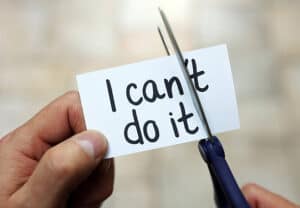The Ultimate Self-esteem: Embrace Your Worth

Discover the power of ultimate self-esteem and unlock your full potential. Boost your confidence, overcome self-doubt, and embrace a positive self-image. Learn valuable strategies and mindset shifts to cultivate a deep sense of self-worth. Elevate your life and relationships with the ultimate self-esteem.

Unleash Your Potential: Attain Ultimate Self-Esteem
The importance of high self-esteem cannot be overstated. This point deserves repetition because its significance is immense. Many mistakenly equate self-esteem with self-confidence, but it goes much deeper. The term “self-esteem” originates from the word “estimate,” meaning to determine value. Interestingly, “vanity” shares this root, indicating that vanity is simply the worth we assign to ourselves.
What are the key components of self-esteem? Individuals with high self-esteem possess a sincere, profound sense of self-worth; they appreciate (and often love) themselves; they are aware of and in control of their inner world; and they act purposefully even when they lack a clear sense of direction. These qualities are not innate gifts we are born with. Throughout many of my self-improvement programs and writings, there is a presupposition that comes from neurolinguistic programming (NLP): what others do, you can study. Therefore, I will start by showing and explaining the behaviors of people with high self-esteem. I’ll break this down into simple, understandable parts so you can easily replicate and incorporate them into your life immediately.
When applied properly, these factors can have a substantial and lasting impact on enhancing anyone’s self-esteem. By integrating these elements into daily life, individuals can experience significant improvements in how they perceive and value themselves.
Creating Your Self-Sense:
Many people I’ve worked with over the years have told me they lack self-confidence. I hear this often. As previously mentioned, self-esteem is the value we place on ourselves, while self-confidence relates to our actions. The term “self-confidence” means to have faith in oneself, implying there is a task or purpose to be accomplished. More specifically, self-belief often pertains to our ability to perform tasks or our level of competence. We feel confident in our abilities to complete a task, behave appropriately in a given situation, or work on a particular project.
From my observations, lacking self-esteem makes it nearly impossible to possess self-confidence. Without a solid foundation of self-worth, it’s difficult to believe in one’s abilities or feel assured in various situations. Self-esteem is essential for building the confidence needed to face challenges and pursue goals.
I once collaborated with a woman who joined as a jail secretary and excelled in her role. After completing her initial training and settling into the criminal justice field, she quickly gained recognition for her intelligence, diligence, and conscientious work ethic. She proved to be a valuable asset to the organization, fostering good relationships with her colleagues. By the end of her first year, she was offered a promotion to a more senior position, along with added responsibilities and a slight salary increase.
After three years in her role, an opportunity for the legal group workplace supervisor position became available. One of the senior partners encouraged her to take it, suggesting it was a natural progression for her within the office. The partner advocated for her appointment, believing she was deserving of the role. However, she was surprised by the suggestion and didn’t feel qualified or capable enough to accept the position, as she hadn’t even considered applying for it.

Embrace your worth and shine brightly with ultimate self-esteem.
She consistently convinced herself that she didn’t deserve praise and that others could have easily accomplished what she did. She also feared that her lack of competence would be noticed by senior partners, exposing her true abilities. Consequently, she stopped striving or applying herself. It’s quite remarkable. Additionally, I understand that you’ve encountered someone similar in this regard.
I encounter many individuals like this. A significant number of them are unable to learn from their successful experiences or the praise they receive. It’s as if they don’t fully internalize the recognition they deserve. Because of this, the woman I mentioned earlier lacked the self-confidence to apply for the promotion, and many people with low self-esteem consistently underperform in their lives. Most of them live their entire lives believing they are unworthy and undervalued.
So learning shall be the aim of our endeavor. I’ve studied those who possess vanity throughout the years, examining their true motivations and behaviors. How do they accomplish this? Ultimately, that’s what matters in the end.
When I was younger, I knew someone who worked at the Independent National newspaper in central London. The newspaper had recently been sold to a new owner and was transitioning from Canary Wharf in the Docklands, where the Mirror group was headquartered, to new offices in a distinct part of the city. Sarah, the Managing Director’s PA, played a crucial role in organizing the relocation, instead of relying on a formal project manager.
Your self is a masterpiece in progress—trust the journey and stay true to you.
She was proud of her achievements, excelled in school, and had risen from secretary to become the MD’s PA in only her second job. She no longer hesitated when asked to assist with unconventional tasks. The day before the office move, the MD was involved in a car accident and needed time off for recovery after a hospital stay. Another director asked Sarah to oversee the relocation due to her deep involvement in the process.
Despite feeling a bit uneasy, she decided to move forward without hesitation. Her confidence stemmed from her thorough understanding of the arrangements already in place and the reassurance of having the MD’s emergency contact number readily available.
I bring this up now to illustrate the differences between these two individuals in various situations. Compared to the woman I previously mentioned, Sarah not only had a more relaxed demeanor but also exhibited a growing sense of self-assurance. This naturally enabled her to gain the confidence needed to handle the last-minute task effectively.
While Samantha maintained a strong belief in herself, the other woman grappled with significant issues of self-esteem. Despite this difference, both individuals demonstrated considerable capabilities. Now, I invite you to consider and answer these questions for yourself:

Let your self-sense guide you to authenticity and fulfillment.
Can you accept compliments without mentally evaluating them or deflecting them verbally or nonverbally?
Do you ever worry that you could one day be “found out”?
Can you quickly list 5-10 things that you appreciate about yourself without hesitation?
When you are requested to do something new or different from what you have done in the past, how do you respond (both inwardly and externally)?
What do you tell yourself in your brain when you are ready to perform something that will test you or be difficult?
Take your time and even think about writing down your responses because it’s usually nice to see this kind of information on paper as well as in your mind. Then, what do your replies imply about you and how highly you regard yourself? Do you monitor yourself well? Are you happy with your identity? Do you hold yourself and your talents to high standards? I suggest writing things down again after you’ve used these strategies and concepts, so you may review and evaluate your results. We’ll now discuss those techniques and tactics in more detail.
Accepting compliments is the first of the methods I need to mention.
The simplest approach to receiving compliments is really to say “Thank you.” Not that difficult, is it? Remember a compliment that someone gave you, no matter how tiny or insignificant, and try replaying it in your thoughts, raising the volume if necessary, saying it to yourself, and then saying “Thank you.” To find some of the techniques that resonate the most with you and that look the most natural, you may need to experiment with a variety of voice tones, accents, mannerisms, and facial expressions.
You should firmly push any barriers in this direction. Repeatedly put this into practice. I may suggest that you practice this in front of a mirror as well, even if it seems strange. Then, when someone next compliments you—and there may be a few—stop doing what you’re doing, even if your old response wants to emerge again. If it occurs, just be mindful of what you accomplished and say “Thank You” in addition. Your brain will examine the new response as you continue to do this, and could start using it automatically.
Concerned about being discovered:
Hmm. Okay, now ask yourself: Exactly what is it that I no longer want other people to understand? Ask yourself the question honestly, then provide a detailed response. Most people simply don’t want other people to think poorly of them or their abilities. This type of worry or anxiety nearly always concerns what you anticipate happening rather than what does manifest; it tends to be disconnected from reality.
A reality check may be necessary at this point. People who constantly feel inferior about their abilities at work or about their looks are underestimating themselves. You should observe the other people in your paintings or your life who appear to be happy with who they are and realize that contentment and ability are unrelated. They don’t go together. At the same time, you just need to take a good look at couples in any public space to see that beauty genuinely is in the eye of the beholder. It has frequently been beneficial to pose challenging questions here to elicit many plausible causes for your pointless concerns:
What prevents you from feeling good about yourself?
If you did (feel good about yourself), what may happen?

Gaining Your Likeness:
Now get out your shallowness magazine or the piece of paper you were going to write on again. We briefly discussed this earlier, so I’d like you to think of anything positive about yourself that you might list. It may be the dimples you have when you smile, the crookedness of your teeth, the fact that you can spell words clearly and effortlessly, the fact that you have good values, or the fact that you are truthful. Everything that applies now does so. Continue gathering items to add to this list. Now, compare this list to your exercise on logical degrees that you completed at the very beginning of this program.
Consider your environment, your ideas and values, your skills, your personality, and your attributes at each stage. You will likely discover a growing number of factors, to varying degrees, that contribute to your unique personal identity. Hold this list in a strategic location so that you may consult it often and keep its contents in mind.
Changing What You’re Doing:
Many people experience anxiety, fear, and stress when presented with novel situations! Oh, oh, a new component! Therefore, if you respond in that way, be sure to list the worst-case scenarios that come to mind. If it may help, really explain them and write them down. That alone can sometimes convince you that your anxieties are unfounded or at least somewhat improbable. They may be, I suppose. But if your worst-case scenario does come true, think about how you might be able to handle it and go over it. Consider a person whom you know would overcome it in more detail. How would they proceed? What strategy would they employ?
Therefore, instead of letting that fear fester inside you as it had been buried, face it head-on and find a way to deal with it. These kinds of tactics can and might defuse the tension much more frequently than not. Don’t do anything if it doesn’t, since your instincts could be correct if it doesn’t.
Getting in Touch With You:
I’ve written about our inner talk a lot before. If you have too much of it and want to use it more effectively, I recommend reading the highly regarded book “The Secrets of Self-Hypnosis: Harnessing the Power of Your Unconscious Mind” or looking through their archives for previous articles. Please remember that the archive is just temporary, so please read those articles before they are transferred.
The point I want to make here is that if you keep telling yourself not to embarrass yourself in front of others, or you keep thinking about how things went wrong in the past, or you keep telling yourself how vain you are, then that internal dialogue voice may be contributing to your issue. I’m aware that it is!
As an alternative, start by imagining what you could say to someone else in a similar circumstance if you wanted to motivate them. Work it out once more, then put it in writing. How could you give them motivation? Then keep bringing up the issues to yourself. Try this. Say those things to yourself instead of all the other junk you used to insist on saying.
Be persuasive and truthful; genuinely mean it. How did that encounter go, exactly? Alternatively, to engage in that style of contemporary inner discourse. You’re cultivating your brain, which could be like a breath of fresh air. Because we connect so frequently, the more supportive you become whenever you generate some internal speech, which has a significant impact on your vanity and self-assurance.

Telling signs of low self-esteem:
How can you determine if someone has vanity? Even though it is so easy to discern, few people pay attention nowadays. One of the most telling signs of vanity in people is that they don’t need to show it. What I mean by it is that they don’t want to:
• Boast.
•Insult other people.
•Name-drop.
•Hog the limelight.
• Tells you about each of them and their accomplishments.
Individuals who display seemingly confident behaviors often have surprisingly low self-esteem. Despite their outward appearance of confidence, they may struggle internally with self-worth and self-doubt. This contradiction highlights that external behavior doesn’t always reflect true inner confidence.
An important event that a friend of mine attended earlier this year in Las Vegas drew more than 500 attendees. Since I knew the keynote speaker, and they were well-known globally, I tried to chat with them as much as I could. I was interested in either finding out more about them or just getting to know them. Before going on to the next level, I chatted briefly with each speaker to ensure that they were all of the greatest caliber and security, that no one was acting nervous because they could be speaking to a high authority, and that everyone was in good spirits.
Nevertheless, I only stated that the other speakers lost interest when the well-known speaker didn’t engage them with any questions. It rather surprised me. Instead, while being completely self-absorbed, the person maintained a nice approach and outward look. It changed into a one-way, independent procedure. I had a feeling that they had not been at all at ease since they were such a well-known speaker. After a verbal exchange, that person then requested if I could spend some time teaching them a few things, and I did so to show that I was willing to do so.
No matter their fame, those with true, sincere vanity often show unique traits.
They exude a serene assurance.
Instead of seeking compliments, they graciously accept them now that they know how much they are worth.
They could be pretty modest.
They understand other people and their accomplishments and are frequently interested in them.
We won’t suffer as a result of developing a poor outward reputation.
Because it frequently speaks for them, you can interpret a person’s frame of reference. Regularly, they are physically stable, erect, calm, and measured in their movements. They also make top eye contact effortlessly and pleasantly.
Even though many people appear to be confident and capable, I have discovered that many of them doubt their talents. I am aware that my lack of shallowness caused me to waste a lot of time parading. These days, I only act haughtily because I am a complete moron. I told you a tale involving a shaggy canine. These people, on the other hand, may advocate for others while failing to advocate for themselves. They are sensitive, yet they are unaware of their limitations. Remember that other individuals, whether aggressive and extroverted or simply quiet and green, will all have a severe lack of empathy.
As with so many things, as with so many areas in which I work, and as we have previously discussed, modeling may truly help. Consider the behavior of people who have a strong sense of self: how do they behave? They seem to be pondering something, but what? To what do they attach importance? Upon what do they all concur? How do you know they are comfortable with themselves? Here, trust your intuition and make the most of your observations. Again, make a note of these details.

In conclusion
Imagine you are an outsider looking in on yourself. As you observe your actions, behaviors, and attitudes, take note of the valuable insights you gain. Reflect on how you can integrate these observations into your life to improve your self-awareness and personal growth. Carefully consider how you might apply these learnings to better understand and appreciate yourself, ultimately fostering a stronger sense of self-worth and confidence.
Do you have any further questions or suggestions? Please share your thoughts in the comments below. I’d love to hear from you.
Related:
How Is Your Self-Esteem- It’s From Within
10 Signs Of Low Self-Esteem-Proven To Be Sneaky
How To Combat Low Self-Esteem: It’s Possible
“How To Reclaim Your Life’s Happiness By Demolishing The #1 Self-Esteem Killer”
Kiersti writes on self-love and personal development professionally. Over the past ten or so years, she has studied self-love and personal growth. Visit https://womansdailyneeds.com/ to learn more about what she does, and like her on Facebook at https://facebook.com/womansdailyneeds to keep up with her.

